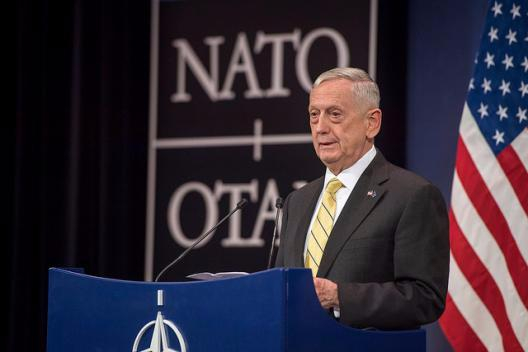 This week Secretary of Defense Jim Mattis is in Europe to discuss the counter-ISIS campaign with European friends and allies. As part of his trip, Mattis will visit NATO’s Enhanced Forward Presence (EFP) battle group in Lithuania. This multinational battalion is led by Germany. Although Lithuania may be one of the smaller countries in Europe, Mattis’ visit to our Baltic ally is an important mission at a crucial time.
This week Secretary of Defense Jim Mattis is in Europe to discuss the counter-ISIS campaign with European friends and allies. As part of his trip, Mattis will visit NATO’s Enhanced Forward Presence (EFP) battle group in Lithuania. This multinational battalion is led by Germany. Although Lithuania may be one of the smaller countries in Europe, Mattis’ visit to our Baltic ally is an important mission at a crucial time.
Lithuania sits at the center of Northern Europe, a region that is newly tense due to continued Russian assertiveness, snap exercises, and remarkable buildup of combat forces near NATO’s most exposed allies. To Lithuania’s southwest sits the Kaliningrad enclave, a region where Russia is installing a powerful network of air defense, ballistic, and anti-ship missiles that could stymie US and NATO efforts to reinforce Lithuania and the rest of northeastern Europe during a crisis with Russia.
Mattis’ visit to Lithuania sends a powerful message that the United States recognizes and engages with those allies who take their own security and fair burden sharing seriously. For years, Estonia has maintained defense spending at the NATO level of two percent of GDP for defense. Lithuania and Latvia have both radically increased defense spending since 2014, and are both expected to reach the NATO target of two percent of GDP for defense by next year. Lithuania also recently re-introduced conscription; meaning that Lithuania is committing both its financial resources and its citizens to the defense of the nation.
But the work to bolster NATO’s northern and eastern flank is far from over. Mattis’ visit is therefore an opportunity to begin the work that is left to do to ensure that the Baltic Sea region does not become a flashpoint between NATO and a revanchist Russia.
For starters, the United States needs to think about it long-term engagement in Lithuania and the other Baltic States. That other NATO members are stepping up to provide forces for NATO’s presence in the Baltics should be applauded, but the United States should also consider some form of presence in order to further strengthen inter-operability with Lithuanian and NATO forces, as well as to familiarize American military leaders with territory they may be asked to defend alongside NATO’s members at some point in the future. It would also send an important message about US commitment to its exposed allies.
Second, the Baltic Sea region badly needs additional air defense capabilities, infrastructure that can support and speed reinforcements, and cyber capabilities. This is not for the United States to provide, but US attention to these gaps will help accelerate investments, and could help uncover opportunities for US-regional cooperation.
Lastly, the Pentagon needs to consider how to strengthen cooperation and capabilities for the maritime domain in the Baltic Sea region. NATO’s first response to the new tensions in the region has been understandably ground focused, but the maritime domain is increasingly important, both in terms of providing an avenue for reinforcements into the Baltic States and as an arena for Russian anti-access/area-denial efforts.
Secretary Mattis’ visit to Lithuania carries both political and strategic importance, and shines a light on a key friction zone in the new European security environment. With President Trump’s first NATO meeting only three weeks away, it is an excellent opportunity to highlight not only allies who are carrying their share of the burden, but also the importance of continued US leadership within and throughout the transatlantic Alliance.
Magnus Nordenman is director of the Transatlantic Security Initiative and deputy director of the Brent Scowcroft Center on International Security at the Atlantic Council.
Image: Secretary of Defense Jim Mattis at NATO headquarters, Feb. 16, 2017 (photo: Sgt. Brigitte Brantley/ US Air Force)
